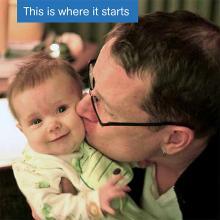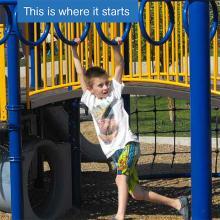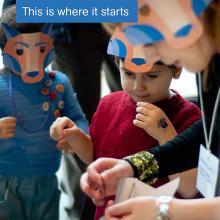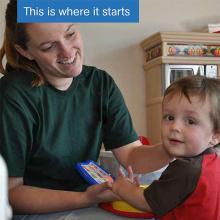This case study is part of This is Where it Starts, a collection of eight case studies on work with children and parents in early years. Case study two.
Background
Corsehill Nursery, part of Corsehill Primary School in Kilwinning. The school already provided a nursery for children from three to five years old. In 2007 North Ayrshire Council used funding from Scottish Government to pilot a project within the school to provide care for vulnerable children under three.
Using a spare space at the school, the 'Moonbeam Room' was created. The service was piloted for two years after which core funding was provided by North Ayrshire Council who were convinced of the value and impact of the project on children and parents. The Moonbeam Room currently provides care for up to ten children, four morning sessions a week.
Funding (and costs where available)
- 2009 provided by Scottish Government
- 2009 onwards provided by North Ayrshire Council
Size and number of staff
Places for ten children under three are available. Two full-time and one part-time nursery staff.
Referral routes
Vulnerable children are referred to the nursery through the Partnership Forum, a multi-agency group of professionals including those from education, social services and health
Key partners
Health, education, statutory and third sector social work services
Established
2007
Key Messages
'This is where it starts' - build relationships with parents early
A key strength of the work with vulnerable under threes at Corsehill nursery is that relationships with parents are established early and then continue throughout the years their children attend the school. Practitioners feel that this kind of long-term, stable, supportive relationship between parents and the school is the bedrock of improving the lives of children and their parents in the early years. Interestingly, when asked what they felt underpinned strong relationships with parents, practitioners said the most important thing was to 'love their children.... and love them (the parents)'. The idea of providing not just support and services but love to these vulnerable children and their parents was striking, and echoes the message from Deacon (2011) who argues that 'We need to be clear that we cannot just spend our way to giving children a good Early Years experience, it takes time, effort, attention - and love' (p14).
Staff reflected on other approaches that support these relationships including:
Pre-admission visits set the tone
Nursery workers undertake preadmission visits with parents which gives them an opportunity to engage in an honest, empathetic, positive dialogue with parents from the outset, as well as learning about particular challenges their children are experiencing.
Be responsive to parents' needs and build their capacity
Practitioners form relationships with parents by closely involving them in the activities of the nursery. Weekly workshops are provided to parents covering a range of topics which aim to build their capacity as parents, but also as individuals. Topics for workshops are chosen largely in response to requests from parents and have included knitting, cooking, Information Communications Technology (ICT) and handling children's behaviour. The nursery employs an extra staff member for parent workshops which means nursery staff can work alongside parents rather than deliver the workshop to them. Staff reflected that these workshops have a significant impact on parents' selfesteem, confidence and wellbeing and importantly put them together with other parents.
Involve parents in their child's learning
Family days are also common where parents take part in 'stay and play' sessions with their children. This gives them an opportunity to see the kinds of play activities the nursery do with their children and how practitioners handle children's behaviour, providing examples and models parents can adopt at home.
Integration within nursery groups
Both nursery staff groups (care for under three and three to five years) work closely and routinely share practice. They also ensure that there are opportunities for children from the two nursery groups to mix with each other. This not only supports children transitioning from the Moonbeam Room to the three to five year old group, but also enables the older children to act as role models which benefits both age groups.
Share practice and resources across the community
Those working in schools and other early years' contexts in the Kilwinning area meet at least once every term for 'cluster meetings'. These provide valuable opportunities to share good practice, swap ideas for activities with children, discuss working with parents, and explore ways to share resources across the community. An example of this was when a staff member from another nursery trained in baby massage was invited to run a session at Corsehill. Establishing relationships with other initiatives in the local area also enables Corsehill workers to put parents in touch with a wider network of resources, support and workshops provided by other nurseries.
References
Deacon S (2011) Joining the dots: A better start for Scotland's children, Edinburgh: Scottish Government






